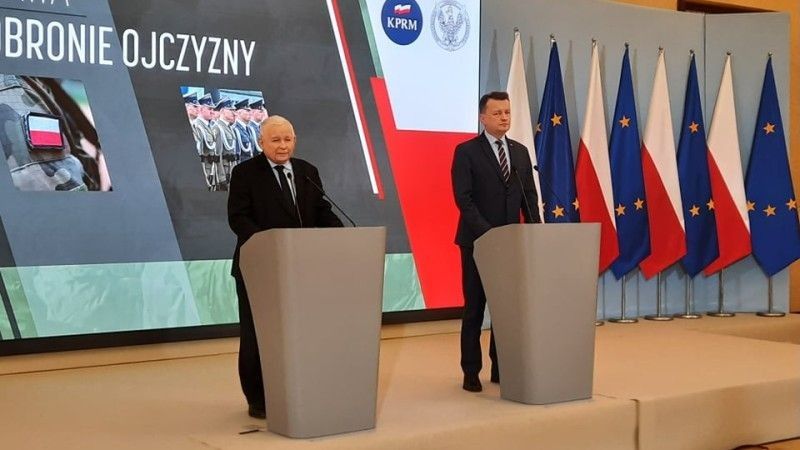- WIADOMOŚCI
Act on Homeland Defence: Kaczyński Announces Major Defence Procurement Boost and Extra Funds
The Polish Government has adopted the Act on Homeland Defence, assuming that changes would happen to the Armed Forces recruitment system, and a financing increase is also expected. The latter is to happen earlier than it had been originally assumed. The reserves system would also be significantly reinforced. Referring to the modernization processes, Deputy PM, Jarosław Kaczyński admitted that most of the procurement would be „unfortunately” done abroad, however, some orders would also be awarded to the Polish industry. The financial market is expected to become one of the sources of funds. Jarosław Kaczyński admitted that extra “off the shelf” procurement may also be permitted.

Photo. Maciej Szopa
As stressed by the Deputy PM, procurement as such would be taking place if an opportunity presents itself, “since there is not a lot of off-the-shelf armament available. Of course, we want to make purchases as fast as possible." Kaczyński recalled that “in most cases, this would be an order followed by a waiting period, at least when it comes to more complex weapons used to fight missiles. This, unfortunately, lasts - especially when it comes to the latest types of weapons that can be acquired”.
Let us recall that in late 2021 Poland decided to procure 300 Cougar MRAP vehicles “off-the-shelf”. Acquisition of 24 Bayraktar TB2 UCAVs or the recently announced purchase of 250 M1A2 Abrams MBTs can also be listed among similar decisions.
Mariusz Błaszczak, head of the Polish MoD, added that the Ministry returned to saturating the Polish Armed Forces with unmanned aerial vehicles. “I want to emphasize the fact that we have restored the drones acquisition programme - involving loitering munitions and reconnaissance systems. Some of them are being delivered by the Polish defence industry, while some are ordered abroad. For instance, last year we have ordered the Turkish Bayraktar drones. So we are aware of the challenges of the 21st Century battlespace, and we are allocating the MoD’s budget to weaponry that is effective, proven, and that is going to significantly increase the capabilities of the Polish Armed Forces”.
These statements were made during yesterday's press conference on the adoption of the Act on Homeland Defence. The Act in question is going to be first read at the parliament in 1 to 2 weeks. “The Act on Homeland Defence is to create a legal framework and financial instruments required for a radical expansion of our military, both when it comes to the numbers, as well as the armament. I think we do not have to explain this. (...) I think we do not have to explain, why we need this Act so much. Poland needs to have Armed Forces adequate to the situation today. Forces that would be able to push back an offensive, strong enough not to have the attack happen”, said Deputy PM, Jarosław Kaczyński, Chairing the Council of Ministers Committee for National Security and Defence Matters.
[ Act on Homeland Defence: New Financing Scheme for the Polish Armed Forces [ANALYSIS] ](https://defence24.com/armed-forces/act-on-homeland-defence-new-financing-scheme-for-the-polish-armed-forces-analysis)
The Act on Homeland Defence is to lead to an increase of the number of troops serving in the military up to 250 thousand. They would be joined by a Territorial Defence Component - 50 thousand soldiers. Contrary to the Act on Reconstruction, Technical Modernization, and Financing of the Polish Armed Forces, the new bill does not list the number of soldiers directly. However, it contains numerous solutions that would make the service in the military far more attractive.
The Act also assumes that extra pay would be given to soldiers who have enough seniority. The service conditions for the NCOs are also to become far more attractive. Career paths for Privates and NCOs have been amended, to liquidate the “glass ceiling”. When it comes to the reserves - voluntary service with 1 month basic, and 11 months specialist training would be key.
“We are introducing new terms pertaining to the forms of military service. Alongside the professional, and territorial military service, we also introduce voluntary, basic military service, reaching out to the youth who have not yet made decisions on their future, to enroll in the Polish Armed Forces”, said the head of the Polish Ministry of Defence, Mariusz Błaszczak. Support schemes have also been prepared, addressing the needs of students at civil universities, who also remain interested in military service.
The new Act assumes that the so-called active reserves are created - reserves, with heightened levels of combat readiness. It is assumed that soldiers belonging to that component would serve once every quarter, for at least 2 days, during their time off their regular job, and at least once every 3 years, once for 14 days. “We also create the term - the so-called active reserves - soldiers who are trained and who, once every quarter, would serve at a garrison during a single weekend, but who may join the military should a need emerge. This idea is derived from the solutions used in the US Army”, stressed Minister Błaszczak.
Furthermore, the original bill also assumes that WKU (Army Recruiting Command) and WSW (Voivodeship Military Staffs) would be liquidated. Instead, Voivodeship Recruitment Centers (Wojewódzkie Centrum Rekrutacji) would be established. Meanwhile, the Territorial Defence Forces would play a greater role in crisis management scenarios.
Provisions on the financing of the Armed Forces also play a very relevant role here. First, it is expected that the 2.5% GDP level of defence spending share would be reached quicker. The said level is to be reached in 2024. This is a major acceleration, since the current regulations mention the year 2030, while the original bill mentioned the year 2026. Armed Forces Support Fund is also going to be brought to life, with finances there coming from the treasury bonds, National Bank of Poland income payments, and assets derived from the bonds issued by the BGK bank.















